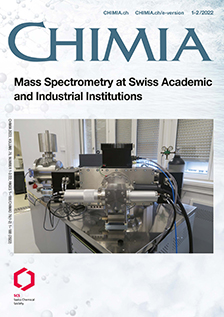Soft Ionization Mass Spectrometry for Studying Noncovalent Interactions
DOI:
https://doi.org/10.2533/chimia.2022.101PMID:
38069755Keywords:
ESI-MS, MALDI-MS, Noncovalent complexes, Soft ionization mass spectrometryAbstract
Biochemistry and structural biology have benefited tremendously from the development of electrospray ionization and matrix-assisted laser desorption/ionization, the two most important soft ionization methods used in modern mass spectrometry. Of importance in this context is that noncovalently bound complexes can be maintained in the gas phase using appropriate sample preparation conditions and instrumental settings in ESI-MS and MALDI-MS. This allows one to determine the architecture and stoichiometry of large noncovalent complexes, the binding of small molecule ligands and cofactors, and often even noncovalent binding affinities, since bound and unbound states can be clearly resolved and quantified using MS. This article presents an overview of the research in this particular area undertaken by my research group at ETH Zurich. I will introduce a number of specialized technologies that we have available in our laboratory, including MALDI mass spectrometry with high-mass detection for measuring complexes with molecular weights in the 100s of kDa range; the so-called “gap sampler” technology for high-throughput experiments; and a temperature programmed spray source for ESI. A number of selected applications will then be presented, including the study of GPCRs and other membrane proteins and their complexes, the determination of the melting behavior of non-canonical nucleic acid structures, the investigation of heterogeneous protein complexes and protein-based capsids, and the investigation of the influence of protein post-translational modifications on noncovalent binding profiles.Funding data
-
Schweizerischer Nationalfonds zur Förderung der Wissenschaftlichen Forschung
Grant numbers 200020_178765
Downloads
Published
2022-02-23
Issue
Section
Scientific Articles
License
Copyright (c) 2022 Renato Zenobi

This work is licensed under a Creative Commons Attribution 4.0 International License.
How to Cite
[1]
R. Zenobi, Chimia 2022, 76, 101, DOI: 10.2533/chimia.2022.101.







